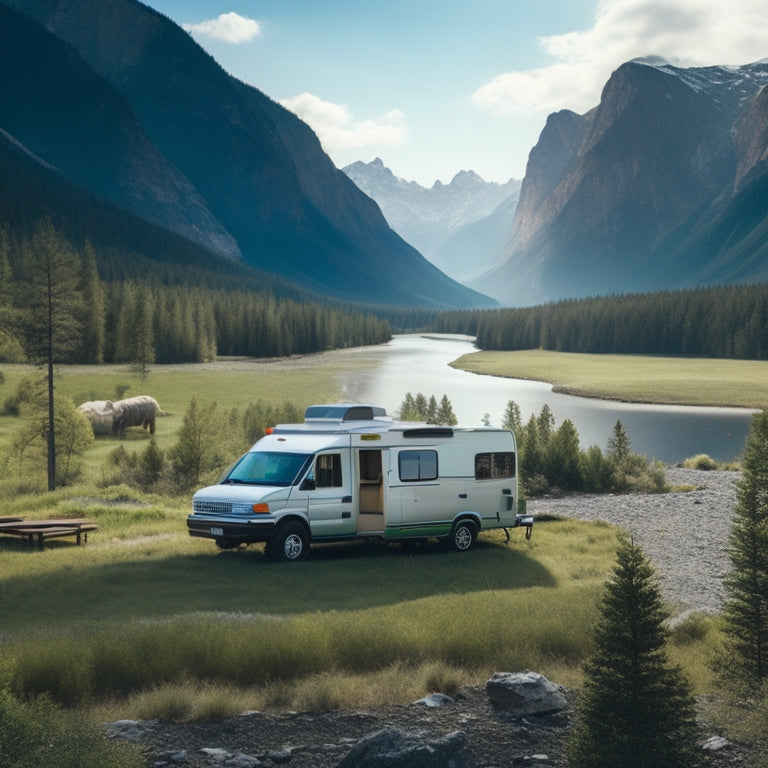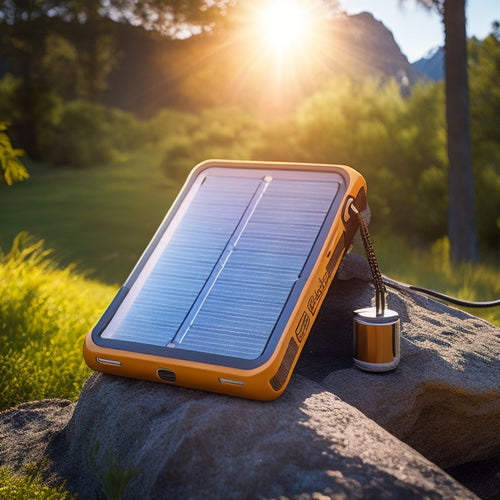
Camping Backup Systems for Off-Grid Adventures
Share
You're preparing for an off-grid journey, and a reliable camping backup system is essential to power your essentials. Solar power is a convenient and cost-effective solution, but you'll need to choose the right panels, batteries, and inverters for your energy needs. Assess your daily energy usage, consider panel efficiency, and prioritize essential appliances to manage power allocation. With the right system in place, you'll enjoy a comfortable and connected experience in the great outdoors. As you investigate your options, you'll uncover how to optimize your system's performance, troubleshoot common issues, and make informed upgrades for a worry-free journey ahead.
Key Takeaways
- Selecting the right solar panel and system sizing is crucial to ensure sufficient power for off-grid adventures, considering factors like energy needs and space.
- Deep cycle batteries, such as lithium or lead acid, provide steady energy flow over time, with lithium being a more eco-friendly and lightweight option.
- Charge controllers regulate energy flow to the battery bank, with MPPT controllers optimizing energy harvesting for varying voltages, and inverters convert DC power to AC for appliances.
- Regular maintenance, inspections, and troubleshooting are essential to ensure optimal system performance, identifying potential issues before escalation, and extending system lifespan.
- Upgrades to more efficient components can improve performance, and prioritizing system performance when considering upgrades can enhance reliability and reduce the risk of unexpected failures.
Understanding Solar Power Basics
How do you make use of the power of the sun to fuel your camping excursions? By exploiting solar energy, you can enjoy off-grid living without sacrificing convenience.
Solar power offers several advantages, including reduced reliance on fossil fuels and lower operating costs. As a camper, you can take advantage of these benefits by integrating solar panels into your backup system, considering Top-Rated DIY Solar Kits that cater to diverse energy needs.
This setup allows you to generate electricity from sunlight, which can be stored in batteries for later use. With a well-designed solar system, you can power essential appliances, lights, and communication devices, ensuring a comfortable and connected off-grid experience.
Choosing the Right Panels
When selecting solar panels for your camping backup system, you'll want to assess panel efficiency, which is measured by its ability to convert sunlight into electrical energy.
You'll also need to determine the ideal wattage for your setup, considering factors like your energy needs and available space.
Additionally, it's crucial to evaluate daily energy usage and roof space for appropriate inverter sizing inverter efficiency ratings.
Assessing Panel Efficiency
In tandem with your camping backup system's energy requirements, selecting panels with ideal efficiency is crucial to secure a reliable and sustainable power supply.
You'll want to evaluate factors that impact panel efficiency, such as panel orientation and shading effects. Proper panel orientation guarantees maximum energy harvesting, while shading effects can greatly reduce energy output. Obstructions like trees or buildings can cast shadows, reducing panel efficiency.
Analyzing panel efficiency also involves evaluating the temperature coefficient, which affects energy output in high-temperature environments.
Selecting Ideal Wattage
With several panel options available, you're faced with determining the ideal wattage for your camping backup system. To do this, you'll need to perform ideal wattage calculations, which involve determining your energy needs. Consider the appliances you'll be powering, their wattage, and the number of hours you'll use them per day.
| Appliance | Wattage | Hours/Day |
|---|---|---|
| Laptop | 65W | 4 |
| Fridge | 100W | 8 |
| Lights | 20W | 6 |
| Total | 185W | 18 |
Battery Selection for Camping
You'll need to select the right battery type for your camping backup system, as different types serve distinct purposes.
You'll want to compare the characteristics of flooded, AGM, and lithium-ion batteries to determine which best fits your power needs. In particular, deep cycle options are vital for camping, as they're designed to provide a steady flow of energy over an extended period.
When sizing your battery, it's important to assess specific energy needs to guarantee you have enough power storage for your appliances.
Additionally, prioritizing essential appliances can help you allocate power effectively and guarantee a reliable supply.
Battery Types Compared
Selecting the right battery for camping backup systems is essential, as it directly impacts the performance and reliability of your power supply.
When choosing between lithium and AGM batteries, consider the key differences. Lithium batteries offer advantages like lighter weights, faster charging times, and a longer lifespan. However, they come at a higher cost.
AGM batteries, on the other hand, are more affordable but have disadvantages like heavier weights and shorter lifespans. Regarding environmental impact, lithium batteries are a more eco-friendly option.
When deciding, think about your usage scenarios and prioritize your needs. If you need a lightweight, reliable battery for frequent camping trips, lithium might be the better choice. If you're on a budget and don't mind a heavier battery, AGM could be the way to go.
Deep Cycle Options
When it comes to camping backup systems, deep cycle batteries are the go-to choice, as they're specifically designed to provide a steady flow of energy over an extended period.
As you select a deep cycle battery, you'll need to take into account lead acid batteries, which are cost-effective but heavy, or lithium batteries, which are lightweight but pricier.
Battery lifespan depends on charging cycles, with most lasting around 300-500 cycles. Weight considerations are essential, as you'll need to transport the battery.
Temperature effects also impact performance, so make sure you store the battery in a cool, dry place.
Monitor discharge rates to prevent over-discharging, and follow maintenance tips, such as equalizing lead acid batteries, to extend their lifespan.
Charge Controllers and Inverters
As you venture into the world of camping backup systems, it's essential to understand the critical role charge controllers and inverters play in capturing and utilizing renewable energy. These components guarantee that your system operates efficiently and safely.
A charge controller regulates the energy flow from your renewable source to your battery bank, preventing overcharging or undercharging. There are several charge controller types, including pulse-width modulation (PWM), maximum power point tracking (MPPT), and shunt controllers.
- PWM controllers are cost-effective but less efficient than MPPT controllers.
- MPPT controllers optimize energy harvesting and are ideal for systems with varying solar panel voltages.
- Shunt controllers are suitable for small systems and provide a simple, low-cost solution.
Inverters, on the other hand, convert DC power from your battery bank to AC power for your appliances.
Understanding inverter functionalities, such as pure sine wave or modified sine wave output, is important for selecting the right inverter for your system.
Solar Power System Sizing
With your camping backup system's charge controller and inverter in place, you're now ready to tackle the crucial task of sizing your solar power system. This involves calculating your energy needs to guarantee your off-grid expedition stays powered. To do this, consider your campsite energy management requirements, including the type and number of portable solar devices you'll need.
| Energy Need | Daily Energy Consumption | Recommended Solar Panel Size |
|---|---|---|
| Lights and laptops | 100-200 Wh | 100-200 W |
| Refrigerator and lights | 500-1000 Wh | 300-500 W |
| Full campsite power | 1500-3000 Wh | 800-1200 W |
| Extended off-grid stay | 3000-5000 Wh | 1500-2000 W |
| High-energy appliances | 5000+ Wh | 2500+ W |
Camping Solar Kit Options
You've calculated your energy needs, and now it's time to select a camping solar kit that fits your off-grid requirements.
When choosing a kit, consider the type of solar panels, portable batteries, and solar accessories you need. Look for lightweight, foldable systems that are easy to set up and transport.
- Portable solar panels with high-efficiency cells for maximum energy output
- Solar charging controllers with built-in maximum power point tracking (MPPT) for efficient energy harvesting
- Portable batteries with high-capacity storage and durable construction for reliable power backup
Maintenance and Troubleshooting
Your solar-powered camping setup relies on a delicate balance of components, and a single malfunction can leave you in the dark. To avoid this, you'll need to perform regular inspections to identify potential issues before they become major problems.
Common issues include loose connections, worn-out cables, and dirt accumulation on solar panels.
Troubleshooting techniques involve checking system performance monitoring data, reviewing maintenance schedules, and evaluating environmental effects on component longevity.
By staying on top of maintenance, you can extend the life of your system and guarantee reliable power.
When upgrades are necessary, prioritize system performance and consider upgrading to more efficient components.
Frequently Asked Questions
Can I Use a Generator With My Solar Power System?
You can definitely use a generator with your solar power system, leveraging generator advantages like reliable backup power during low-sun periods, and creating a hybrid system that guarantees a steady energy supply when you need it most.
How Do I Protect My System From Lightning Strikes?
Safeguarding your setup from savage strikes, you'll wisely install lightning rods and surge protectors to shield your system from electrical shocks, ensuring your equipment remains resilient and reliable in the face of fierce lightning storms.
Are Solar Panels Affected by High Winds or Hail?
You'll be relieved to know that solar panels are designed to withstand harsh weather conditions; their durability is tested for wind resistance, and most can handle high winds up to 140 mph and hail up to 1 inch in diameter.
Can I Charge My Electric Vehicle With a Camping Solar Kit?
You're planning to trade in your tent for a Tesla, huh? Unfortunately, you won't be charging your electric vehicle with a camping solar kit anytime soon - the charging capacity and solar efficiency just aren't there to support your EV's power needs.
Do I Need to Register My Off-Grid Camping System With Authorities?
You'll need to research regulatory requirements in your area to determine if you must register your off-grid camping system with authorities, as some regions require camping permits or licenses for certain types of equipment.
Related Posts
-

How to Achieve a Zero-Waste Lifestyle for a Greener Tomorrow
To achieve a zero-waste lifestyle, start by adopting the principles of refusing, reducing, reusing, and recycling. Sw...
-

Why Outdoor Solar Lighting Systems Are Sustainable
Outdoor solar lighting systems are sustainable because they utilize renewable energy, drastically reducing your carbo...
-

Fastest Solar Chargers for Emergency Power
When choosing the fastest solar chargers for emergency power, you need to focus on features like rapid charging capab...


